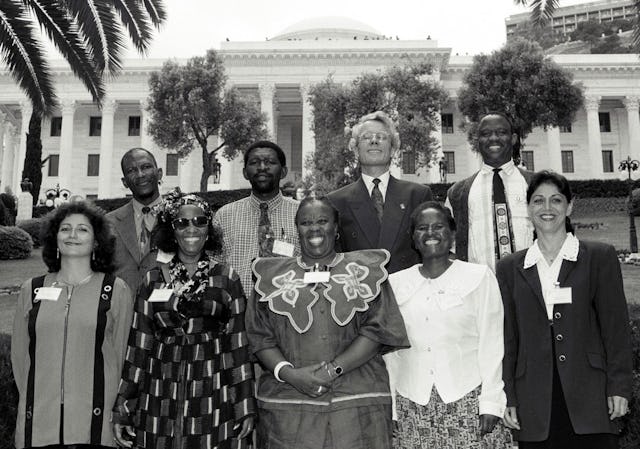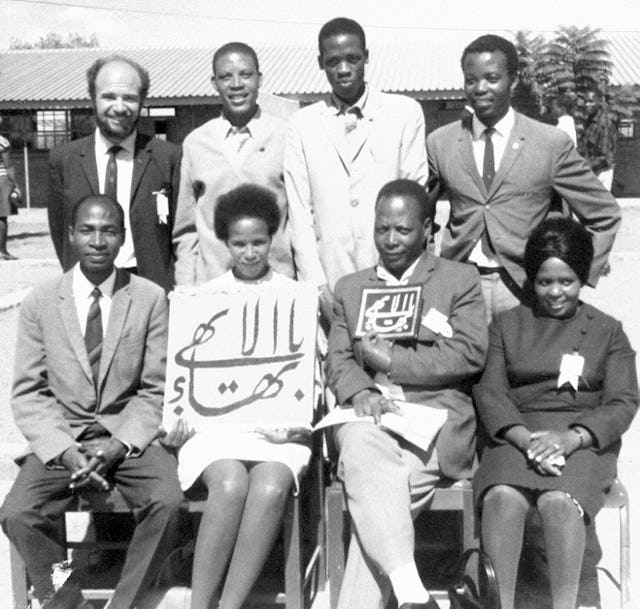Minister praises Baha'i activities
GABORONE, Botswana — Half a century ago, because of apartheid restrictions, the Baha'is of Botswana had to meet under the cover of darkness. But now the community receives effusive public praise.
The minister of local government of Botswana, Margaret Nasha, commended the activities of the community when she addressed its golden jubilee held 10 to 12 December 2004.
Dr. Nasha said the Baha'i community, with its systematic training courses, was seeking to "further the development of Botswana along moral and ethical lines."
Listening to her speech were jubilee participants who had come from as far away as Australia, Canada, Chile, India, and the United States.
Many others had traveled from nearby African countries including the Democratic Republic of the Congo, Lesotho, Malawi, Namibia, South Africa, Swaziland, Zambia, and Zimbabwe.
Dr. Nasha spoke of the importance of Baha'i capacity-building study circles, which enhance, for example, abilities to teach values to children, to express one's views more eloquently, and to assist others to independently investigate spiritual truths.
She also praised the Baha'i children's classes, which are open to the wider public, as are Baha'i study circles and devotional meetings.
Dr. Nasha said that Baha'i children's classes teach "the oneness of humanity, the equality of boys and girls in the eyes of God, and the need for honesty and kindliness in their dealings with other people."
"I commend the teaching of these virtues," she said, "because they ensure that our nation's development is based upon a moral, ethical, and tolerant foundation."
Fifty years ago, attempts to carry on Baha'i activities based on the Faith's fundamental principle of the oneness of mankind received no such official endorsement.
Segregation
Until independence in 1966, the country, then known as the Bechuanaland Protectorate, was administered from Mafikeng in apartheid South Africa.
As such, Mafikeng was subject to strictly imposed conditions of racial segregation. Baha'is had to take extreme precautions if whites and blacks were to gather in mixed groups.
At the jubilee, a Botswana Baha'i, Lally Warren, told participants that as a young child in Mafikeng it had been unusual to meet white people who were pleasant to her so she believed that all white people were bad.
That changed when she met the Robarts family, Canadian Baha'is who introduced the Faith to Bechuanaland in 1954.
"The Robarts didn't treat me like a black child, they treated me as a child," she said.
She recalled when she was 10 and the Robarts family came to her house for meetings with her parents James and Stella Moncho, the first local couple to become Baha'is.
"They could only do this at night, and as they came towards the house they would switch their [car] lights on and off to say, 'Is it ok, is it safe, can we come?'" said Mrs. Warren, who was a member of the Continental Board of Counsellors in Africa from 1985 to 2000 and has served the Baha'i Faith in many other capacities.
"There was no electricity in the black area during those days so my mother would take a lantern and stick it out through the window and wave it to say, 'OK, it's safe for you to come.'"
Nina Robarts, who was a teenager at the time, told the jubilee participants about the drama of those nights.
"When we saw the lantern, that was the most glorious sight for us -- it meant we were going to see our African friends that night," said Ms. Robarts, who now lives in Canada.
She is the daughter of the late John and Audrey Robarts, who each received the accolade of Knight of Baha'u'llah from the then head of the Faith, Shoghi Effendi, for moving to Bechuanaland to introduce the Faith.
Mr. Robarts (1901-91) was later named a Hand of the Cause of God, whose duties were to protect and propagate the Faith. A filmed interview with him, "Retrospective," was shown at the jubilee.
Early believers
A message written on behalf of the Universal House of Justice to the jubilee participants said that "this historic event, at which the shining spirit and soul-stirring exploits of the early believers will be recalled, will surely inspire the friends to arise with renewed dedication to bring the healing Message of Baha'u'llah to the indigenous peoples of your beloved country."
Among the other "soul-stirring exploits" described at the jubilee was the way Mr. and Mrs. Robarts were able to present the Faith to local people. They befriended Modiri Molema, a highly respected medical doctor and the only black man who was permitted to associate with whites.
Dr. Molema invited his friends and family to hear about the Baha'i Faith, and he gave the Robarts family letters of introduction to the dikgosi (traditional chiefs) of the Bechuanaland Protectorate.
Dr. Molema accepted the Faith but his enrolment was not made public because of likely harassment due to his previous high-profile political involvement. In 1955 his relative, Stanlake Kukama, became the first native Tswana of Bechuanaland to become a publicly declared Baha'i.
Mr. Kukama, who attended the jubilee celebrations, said he had been an anti-apartheid activist, and was a member of the South African political party, the African National Congress.
He said he had detested white people because of their attitude towards Africans but that changed when he heard about the Baha'i Faith from the Robarts family.
"In 1955 I heard of the Baha'i Faith," Mr. Kukama said, "and [found] the principles of the Faith were the solution to [achieve] peace and harmony for mankind."
"I realized that the white and the black were all blind. They did not see the truth, they did not have the eye of the soul.
"Hence, I became a Baha'i, and renounced man-made solutions to peace.
"I was healed. I got a spiritual prescription and I thought I should give it to my people. From there I was so excited!" he said.
The African National Congress tried to woo back Mr. Kukama for many years without success. The police kept him under surveillance even after he became a Baha'i because they did not believe that he had given up partisan politics.
Mr. Kukama later served for many years both as a member of the National Spiritual Assembly of the Baha'is of Bophuthatswana and of South Africa.
Other early Baha'is present at the jubilee celebrations included Goitsemodimo Bolokang, Gaolebale Komanyane, Mothusiotsile Matabane, Esther Moncho (a member of the first National Spiritual Assembly), and Michael Nthau.
The participants made fond mention of other members of the community who had made significant contributions to the Botswana Baha'i community but were unable to attend the jubilee.
They included former member of the Continental Board of Counsellors Shidan Fat'he-Aazam, and a Baha'i from the United States, Jeff Gruber, who organized the translation of many of the Baha'i writings into the local language of Setswana and who personally translated Baha'i scripture into several Bushman languages.
One of the members of the first National Spiritual Assembly of the Baha'is of Botswana, Maureen Page, now from the United States, presented a gift of framed photographs of Madame Ruhiyyih Rabbani, the widow of Shoghi Effendi and a Hand of the Cause of God, that were taken during her visit to the Bushmen (San) people in the Kalahari desert of Botswana in 1972.
Among the other Hands of the Cause to visit Botswana during the past 50 years were Collis Featherstone, Paul Haney, Rahmatu'llah Muhajir, Adelbert Muhlschlegel, and Enoch Olinga.
Program
A member of the Continental Board of Counsellors in Africa Enos Makhele spoke at the jubilee about the significance of the Baha'i history in Botswana and the achievements and the future plans of the community. There are 30 Local Spiritual Assemblies in Botswana, and Baha'is can be found in several hundred villages and other localities.
Baha'i choirs from the villages of Oodi and Tlokweng, as well as the National Jubilee Choir and the Swaziland Baha'i youth choir provided uplifting entertainment.
A dramatic presentation by a group of Baha'i youth portrayed traditional and modern aspects of cultural life in Botswana.
The jubilee celebrations were covered by the National Television of Botswana, the private television channel GBC, and two newspapers, the "Daily News" and "Mmegi."
For more about the Baha'i community of Botswana see

